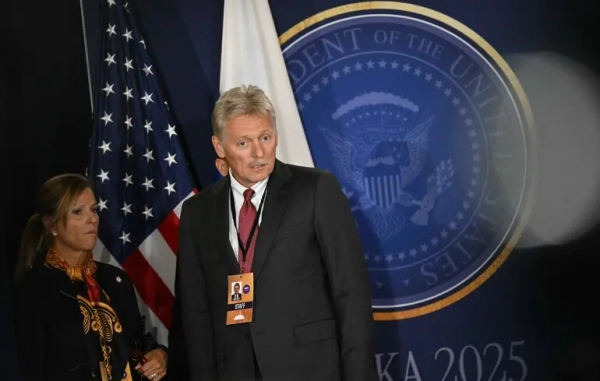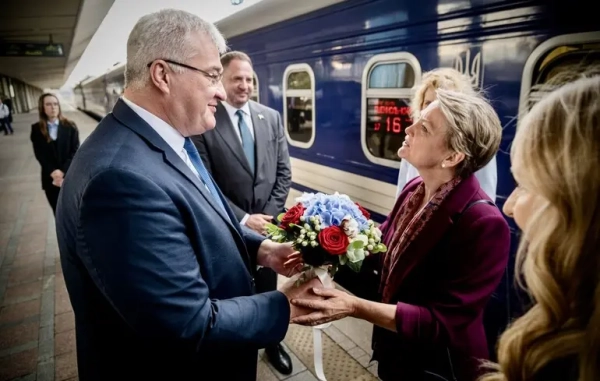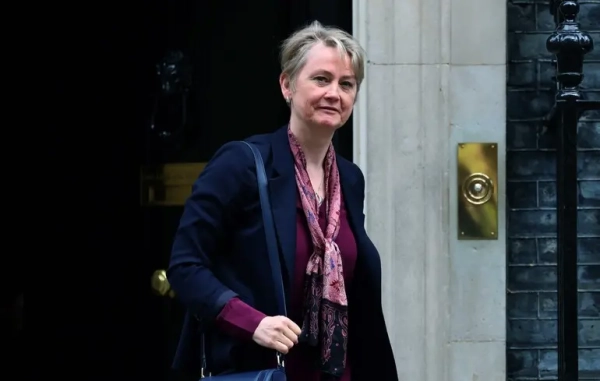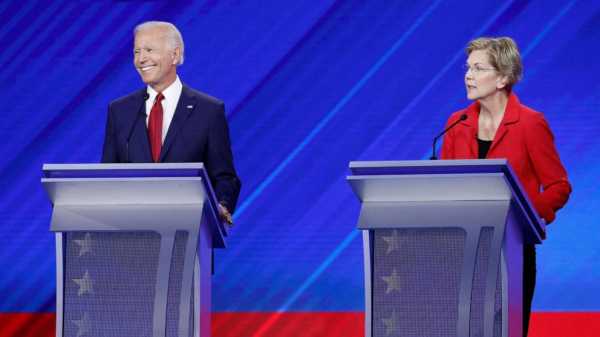
The TAKE with Rick Klein
Interested in The Note?
Add The Note as an interest to stay up to date on the latest The Note news, video, and analysis from ABC News.
The Note
Add Interest
An impeachment inquiry. A foreign-policy crisis. A trade-war truce. And a heart attack.
It’s been a wild month since the Democratic candidates last debated each other. Earth-rattling events have reshaped the contours of the race, as a record 12 contenders are set to take the stage outside Columbus, Ohio, on Tuesday night.
Yet for all that’s changed, former Vice President Joe Biden and Sen. Elizabeth Warren remain the top two in the polls — and not necessarily in that order anymore. The focus on impeachment has crowded most of the other candidates out of the news.

Heidi Gutman/Walt Disney Television
Democratic presidential hopefuls Joe Biden and Elizabeth Warren participate in the third Democratic primary debate hosted by ABC News in partnership with Univision at Texas Southern University in Houston, Texas, Sept. 12, 2019.
Those on stage will almost certainly be invited to weigh in on Biden, given the way President Donald Trump has made him a target. In a portion of an interview with ABC News, released Tuesday morning, Hunter Biden said he made a “mistake” in accepting work that would fuel negative perceptions of his father.
“I gave a hook to some very unethical people to act in illegal ways to try to do some harm to my father,” he said.
Meanwhile, Sen. Bernie Sanders’ health scare has put more attention on Warren, even as Sanders readies a sharper contrast with his longtime friend.
The new additions to the stage since the last debate — Tom Steyer and Rep. Tulsi Gabbard — offer stark contrasts to both Biden and Warren in their own ways. And several other candidates come to Ohio knowing they may not earn a ticket to the next debate in Georgia next month
External events have brought new urgencies to the race for president. For Democrats, however, they may have also clarified the choices.
The RUNDOWN with MaryAlice Parks
Florida, Michigan, Texas and now Ohio.
Democrats have used their presidential primary debates to visit and spotlight key battleground states ahead of the 2020 elections.
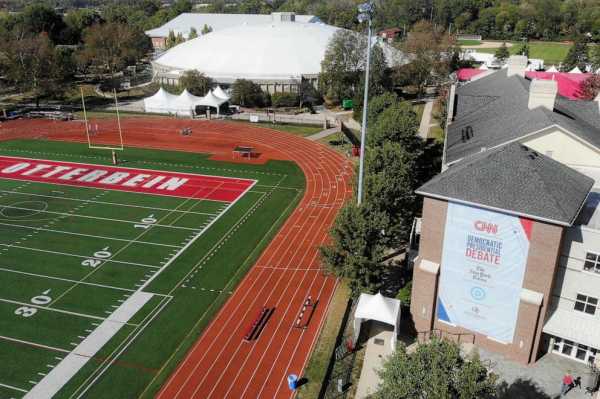
John Minchillo/AP
A CNN sign hangs on the side of a buidling near an athletic field outside the Clements Recreation Center where the CNN/New York Times will host the Democratic presidential primary debate at Otterbein University, Oct. 14, 2019, in Westerville, Ohio.
After President Barack Obama won Ohio twice, Trump dominated the state in 2016, besting Hillary Clinton by 8 percentage points. In 2018, Republicans were able to keep the governor’s mansion and win several other state-wide races, though Democratic Sen. Sherrod Brown also kept his seat.
The status quo midterm election results, in a year Democrats did so well elsewhere, only reinforced a growing fear in the Democratic Party that the state may be much harder to win back than others in the heartland.
Democratic National Committee officials told reporters on Monday that the party is planning to expand their ground game in the state. They pointed to state house seats that they flipped in 2018 and say they will focus on Trump’s past statements on health care and saving manufacturing jobs.
The TIP with Justin Gomez
For most of this Democratic primary, South Bend, Indiana, Mayor Pete Buttigieg has resisted attacking his opponents — even when provoked — but recently the presidential candidate has been raising his voice to call out some of their positions. It’s a new tactic we’ve yet to see from him before.
Buttigieg previously praised Warren for having a “good message,” but he’s now spoken out on the issue of her refusal to admit that her “Medicare for All” plan would raise taxes on the middle class. He’s also blasting her fundraising strategy to not hold fundraisers with wealthy contributors through the general election, telling Snapchat’s “Good Luck America” that a Democrat can’t beat Trump “with pocket change.”

Scott Olson/Getty Images
South Bend, Indiana Mayor Pete Buttigieg speaks to guests during the United Food and Commercial Workers’ (UFCW) 2020 presidential candidate forum on October 13, 2019 in Altoona, Iowa.
Former Rep. Beto O’Rourke has tried to get into a back-and-forth with Buttigieg over mandatory buybacks of automatic weapons several times, but Buttigieg has resisted taking a swing at the former congressman — until now. The mayor says it’s simply a policy disagreement and is accusing O’Rourke of needing to “pick a fight in order to stay relevant.”
Buttigieg hasn’t attempted to call out his fellow candidates in person during the previous debates, but with all three sharing the stage in Ohio on Tuesday, and Buttigieg standing next to Warren, that could change.
THE PLAYLIST
ABC News’ “Start Here” podcast. Tuesday morning’s episode features ABC News’ Amy Robach, who tells us about her exclusive interview with Hunter Biden, who continues to field questions about his role on the board of a Ukrainian company while his father, Joe Biden, was vice president. “He went on to say that in hindsight he can admit that it was a mistake to take that position.” http://apple.co/2HPocUL
ONE MORE THING
As President Donald Trump continues to fill his Twitter feed and campaign speeches with attacks on Hunter Biden over his foreign business deals, the former vice president’s son defended the ethical implications of his private ventures in an interview with ABC News, but conceded taking a misstep in failing to foresee the political implications on his father’s career.
WHAT YOU NEED TO KNOW TODAY
Sourse: abcnews.go.com
